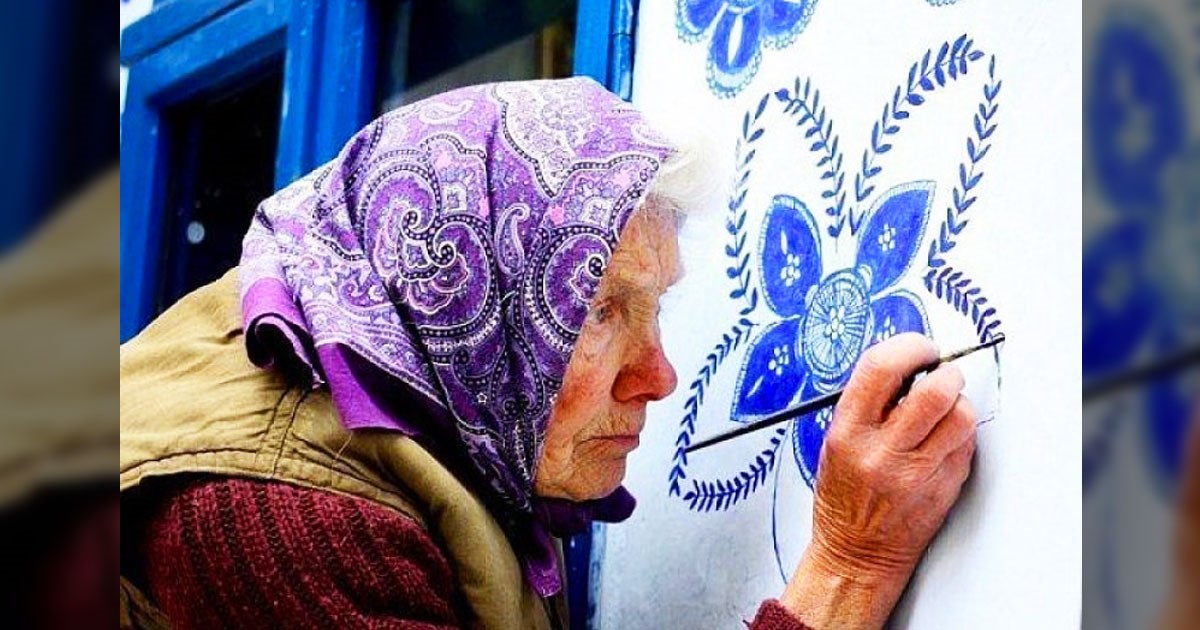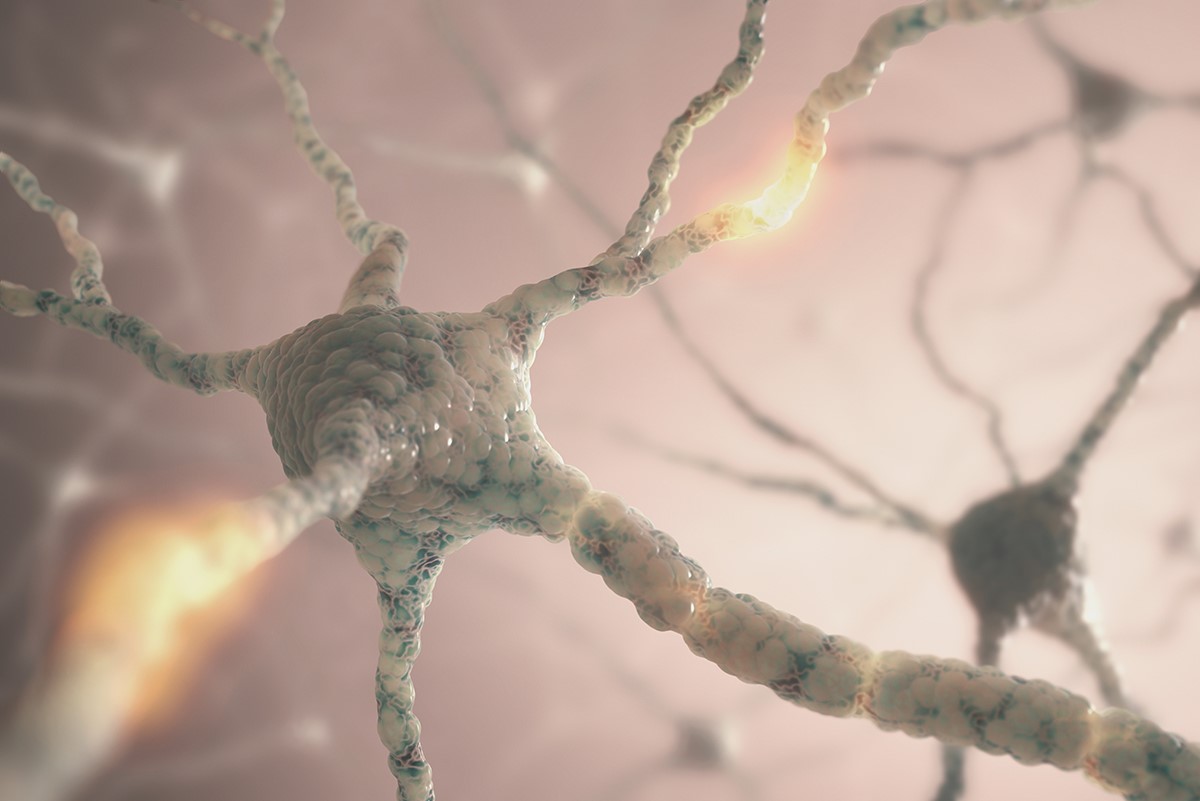90-year-old Anežka Kašpárková is living proof that age really is just a number!
Anežka is spending her retirement embellishing the homes of her neighbours and her village’s chapel with Moravian artwork.

Anežka Kašpárková is a 90-year-old woman who is fulfilling her dream of becoming an artist while refusing to let age get in her way. Having worked hard as a farmer before she retired, she could be spending her well-earned retirement relaxing. She deserves a break, after all, she worked hard for decades. Instead, Anežka chooses to spend her time painting the houses in her village with beautiful floral designs. She has been painting buildings around the village for 30 years.

She began by taking lessons with an elderly artist, so she could continue the village tradition of decorating the walls of houses with flower garlands. Using the houses as her canvas, Kašpárková only works with ultramarine blue because of how it looks against the white walls. She always makes sure the drawings are detailed, refined and comprehensive and the paint is of a good quality. It all means the paintings will last up to two years! She is living proof that age really is just a number, especially when it comes to embracing your creativity. But what’s Anežka Kašpárková’s secret? How did she beat the mental process of aging?
Embrace the gift of neuroplasticity!
It is amazing how at the age of 90, some individuals have such sharp cognitive skills that it looks like their brain hasn’t aged at all. In fact, these people manage to keep their minds sharp by devoting themselves to tasks which invariably require high functioning cognitive skills. As the pioneering work of Marion Diamond proved 50 years ago, we know that under the influence of the positive effects of an enriched environment, the brain can actually grow and renew its connections. This means that, with proper stimulation, brains continue to develop even in adulthood! As well as being ground-breaking, this was a very positive outlook that changed the way we understand the brain’s aging process forever. However, there are still some misconceptions that can hinder the joy of the process of aging.
Common Misconceptions about the Mental Process of Aging

There are many misconceptions associated with aging that affect our loved ones as they grow older. These stigmas can negatively impact our elderly loved ones and may affect their interactions with others. However, the later years of life often bring an increase in expendable time, allowing for new experiences and connections. Unfortunately, some elderly people may feel as if they are no longer productive or valuable. It is important as caretakers and family members to help our loved ones embrace the fact that “old age” can be filled with meaning and purpose for those who choose to explore the possibilities. Misconceptions that can be problematic for our elderly loved ones are:
Misconception 1 – Brain Power Lessens as we Age
Mental conditions like dementia, that decrease short or long-term memory, commonly affect the elderly. However, the idea that everyone loses memory function as they age is fundamentally untrue. Math, verbal abilities and abstract reasoning can actually improve as we grow older. However, it is important to nurture and work on your brain just like you would any other part of your body. Mental stimulation such as a Sudoku®, crossword puzzle or social interaction can play a critical role in keeping the mind sharp and warding off degenerative conditions.
Misconception 2 – We Become Less Happy as We Age
Old-age is often associated with depression, loneliness and isolation. However, getting older means having more spare time to enjoy hobbies and interests. Recent happiness studies have indicated that, with fewer obligations, people tend to be happiest at retirement age. If you notice a drop in your loved ones’ cheerfulness, it is important to share with them the wealth of opportunities available to older individuals. They may rediscover an old talent or develop a new passion that they never knew existed.
Misconception 3 – Older Adults are Lonely
Losing family members and close friends is unfortunately a natural part of life. Feeling socially isolated can lead to a decrease in happiness and a feeling of loneliness for your elderly loved ones. However, there is a multitude of social activities and programs designed to help those in similar situations maintain positive human interactions. Volunteering opportunities, social clubs and senior centres can stimulate social connections that can support your elderly loved ones through the process of aging.
Misconception 4 – Older Adults Have Multiple Health Problems
There is no denying that our bodies will wear down as we age. However, growing old does not necessarily mean we have to forfeit our independence and spend the rest of our lives in a hospital. While some older individuals may develop health complications, many of them can be avoided through maintaining a healthy lifestyle. Proper nutrition and exercise, can play a significant role in avoiding health complications. It is important that you assist your loved ones in this process and encourage them to remain active. If navigating their home is a deterrent to staying active, you might want to consider getting a Stannah Stairlift which will ensure they are able to move about freely in their home safely and independently.
Misconception 5 – “You Can’t Teach an Old Dog New Tricks”
This proverb is often associated with the aging process, particularly when our elderly loved ones find it difficult to perform an unfamiliar task. While the strategy for learning new skills may be different to what it was in their youth, it is important that your elderly loved ones do not shy away from tackling new hobbies and challenges. Processing new information like this can actually help keep their mind sharp and provide an interesting task to keep them stimulated throughout the day.
The fear of aging is often brought about by misconceptions associated with the process. It is important that you and your elderly loved ones look at growing older as a chance to explore new ventures, just like Anežka Kašpárková. By staying active, engaged and open to new experiences, the later years of life could be some of the most rewarding.

 USA
USA